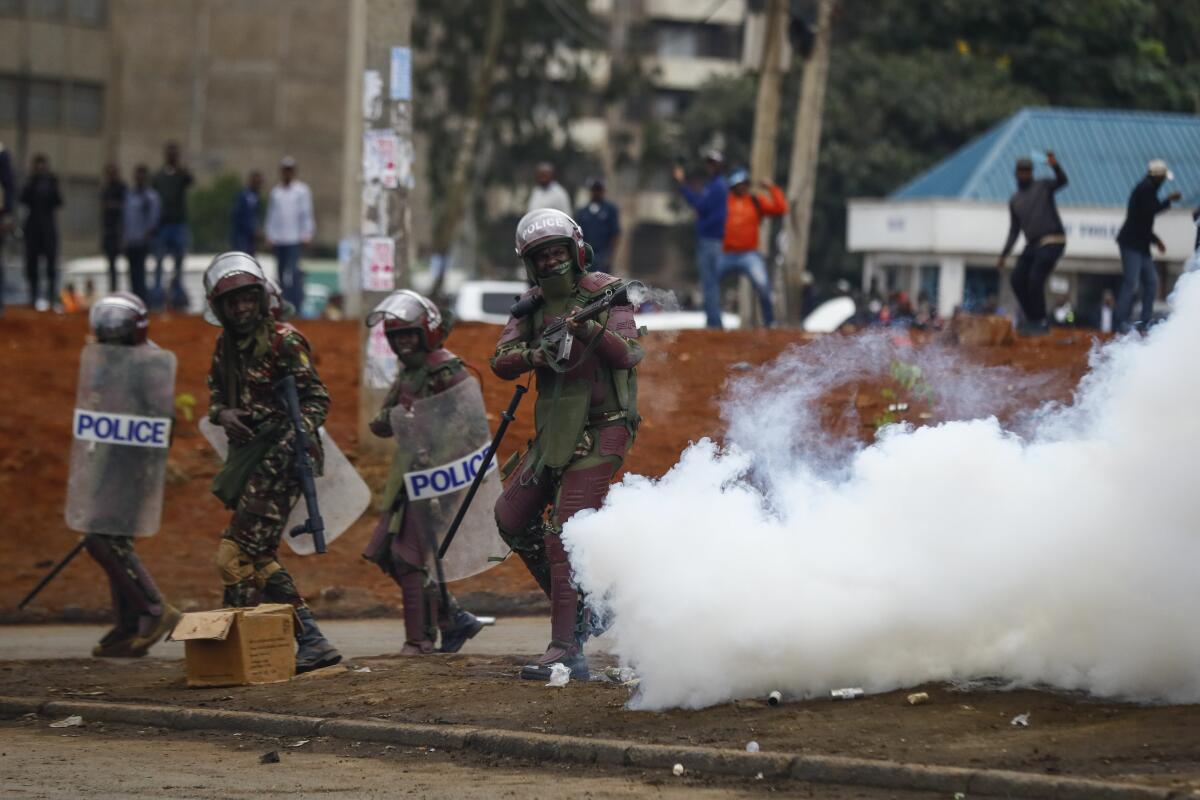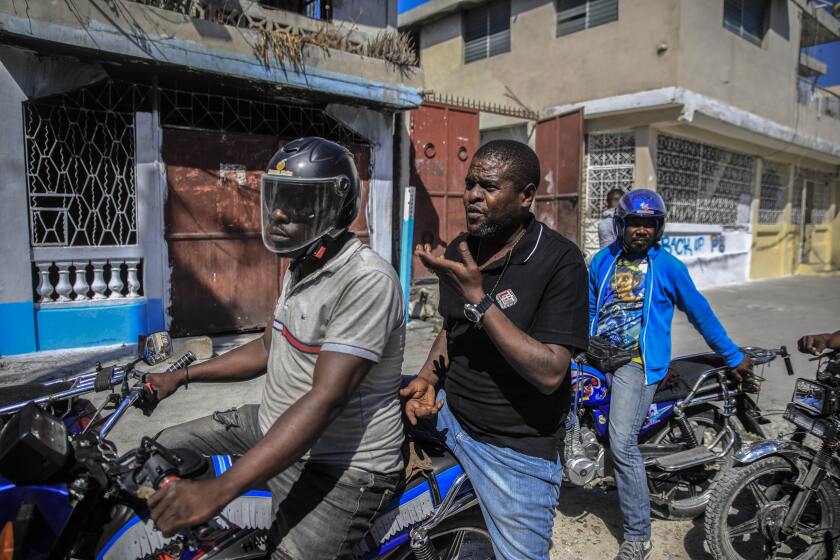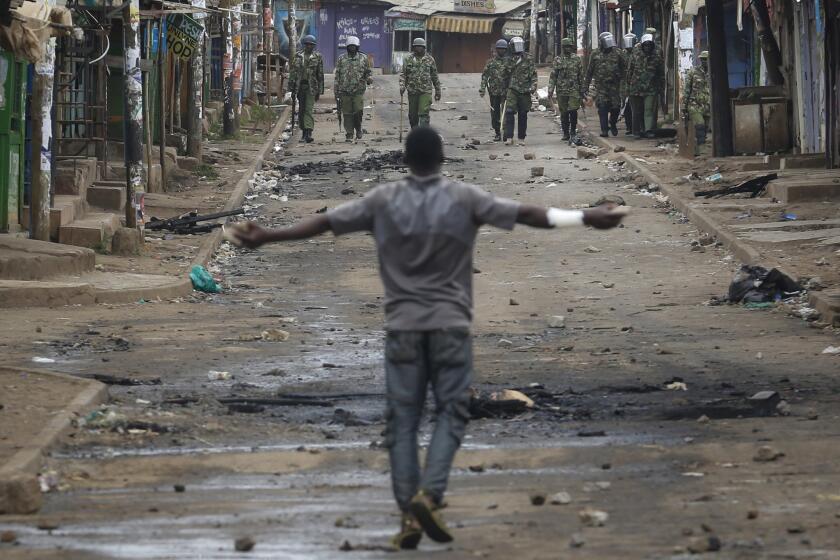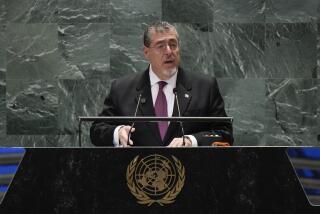U.S. wants Kenya to lead a 1,000-police force in Haiti. Watchdogs say they’ll export abuse

- Share via
NAIROBI, Kenya — As the U.S. government was considering Kenya to lead a multinational force in Haiti, it was also openly warning Kenyan police officers against violent abuses. Now 1,000 of those officers might head to Haiti to take on gang warfare.
It’s a challenging turn for a police force long accused by rights watchdogs of killings and torture, including gunning down civilians during Kenya’s COVID-19 curfew. One local group confirmed that officers had fatally shot more than 30 people in July, all of them in Kenya’s poorest neighborhoods, during opposition-called protests over the rising cost of living.
“We are saddened by the loss of life and concerned by high levels of violence, including the use of live rounds” during those protests, the U.S. said in a joint statement with 11 other nations in mid-July.
Now the U.S., as this month’s president of the U.N. Security Council, is preparing to put forward a resolution to authorize a mission in Haiti led by Kenyan police, who have relatively little overseas experience in such large numbers and speak neither French nor Haitian Creole, the Caribbean nation’s official languages.
“This is not a traditional peacekeeping force,” Linda Thomas-Greenfield, the U.S. ambassador to the United Nations, said Tuesday.
Armed men such as ‘G9 Family and Allies’ gang leader Jimmy Cherizier are filling the power vacuum left by a crumbling government.
For more than nine months, the U.N. had appealed unsuccessfully for a country to lead an effort to restore order to the poorest nation in the Western Hemisphere.
Kenya’s interest was announced on Saturday, with its foreign minister saying his government had “accepted to positively consider” leading a force in Haiti and sending 1,000 police officers to train the Haitian National Police, “restore normalcy” and protect strategic installations.
“Kenya stands with persons of African descent across the world,” Alfred Mutua said. A ministry spokesman didn’t respond to questions about the force or what Kenya might receive in return.
U.S. Secretary of State Antony J. Blinken praised Kenya on Tuesday for simply considering the move, highlighting the difficulty in mustering international forces for Haiti, where deadly gang violence has exploded since the 2021 assassination of President Jovenel Moise.
Some organizations that have long tracked police misconduct in Kenya are worried.
President Daniel Arap Moi returns home today from a surprisingly cool reception in Washington that Western diplomats here attribute to the sharp deterioration of Kenya’s human rights situation in the last year.
“We had some consultations with Kenyan [civil society organizations] last week and there was general consensus that Kenya should not be seen to be exporting its abusive police to other parts of the world,” Otsieno Namwaya, Kenya researcher with Human Rights Watch, told the Associated Press.
Kenya’s security forces have a years-long presence in neighboring Somalia to counter Islamic extremists — a deadly threat that some Kenyans say should keep police at home — and troops have been in restive eastern Congo since last year. Its past U.N. peacekeeping deployments include Sierra Leone.
But while other African nations including Rwanda, Ghana and Egypt have thousands of personnel in U.N. peacekeeping missions, Kenya has fewer than 450, according to U.N. data. Just 32 are police officers. The U.S. has a total of 35 personnel in U.N. peacekeeping missions.
“I have no knowledge of any complaints raised by the U.N. during those deployments, hence no concern on my end,” Peter Kiama, executive director of the watchdog Independent Medico-Legal Unit in Kenya, told the AP.
“The major challenges regarding policing practices in Kenya include political interference with police command and independence, inadequate political will to reform the institution, culture of internal impunity and criminality, and inadequate internal and external accountability,” he said.
With the proposed Haiti deployment, Kenyan police would likely be in charge instead of answering to a U.N. force commander as in traditional peacekeeping missions.
Kenyan voters choose between incumbent President Uhuru Kenyatta and his rival Raila Odinga.
Haitian Prime Minister Ariel Henry said Tuesday that he had spoken with Kenyan President William Ruto to thank Kenyans for the “demonstration of fraternal solidarity.” Kenya plans to send a task force in the coming weeks to assess the mission’s operational requirements.
“We have to find someone who can help us,” Port-au-Prince resident Benice Pierre said Wednesday.
At home, Kenya’s police force has received millions of dollars in training and support from the U.S., the European Union and other partners in recent years, with Washington focusing on “promoting police accountability and professionalism.”
But last week, Kenya’s National Assembly saw a shouted debate, along with demands for a moment of silence, over police actions during the recent protests.
“The kind of brutality that has been meted out on innocent and unarmed civilians in the last couple of months has been unprecedented,” minority leader Opiyo Wandayi said. “Those youth that you are killing require jobs, not bullets.”
Kenya’s leading opposition party has threatened to gather evidence of police abuses to submit to the International Criminal Court.
One Kenyan’s online crusade against corruption
In response, Interior Minister Kithure Kindiki said that police had remained “neutral, impartial and professional.” The ministry referred questions about alleged abuses to the police, who haven’t responded.
Ruto, elected president of Kenya a year ago, at first praised police for their conduct during the protests, but warned officers against extrajudicial killings as a public outcry grew.
Problems with Kenya’s police force have long been acknowledged, even by officials.
The National Police Service “does not have a ‘shoot to kill’ policy,” its inspector general, Hillary Mutyambai, said in a submission to a parliamentary inquiry on extrajudicial killings and enforced disappearances released in late 2021.
But the government-created Independent Policing Oversight Authority told the inquiry it had received 95 cases of alleged deaths due to police action in the previous seven months alone, noting “continuous abuse of force and firearms occasioning deaths.”
A commissioner with the authority said last month that police weren’t even reporting deaths to the body as required, which is illegal.
More to Read
Sign up for Essential California
The most important California stories and recommendations in your inbox every morning.
You may occasionally receive promotional content from the Los Angeles Times.















